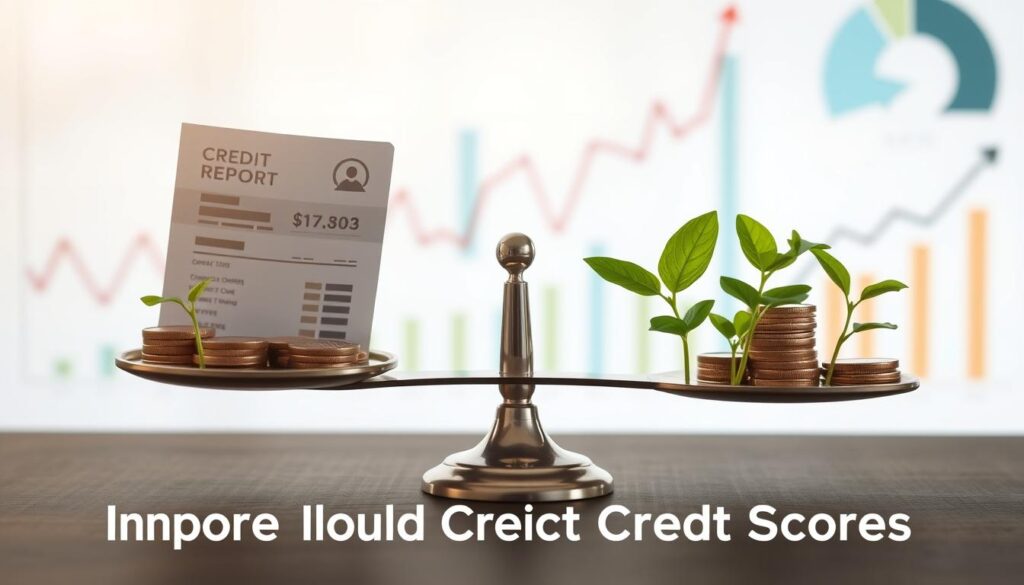A strong credit score is vital in today’s financial world. It affects loans, rentals, and even job prospects. For many, maintaining good credit can be tough. Credit repair might be the answer if you’re struggling.
But what’s the real cost of fixing your credit? This guide will break down the expenses involved. We’ll explore fees, services, and strategies to boost your credit score.
You’ll gain insight into budgeting for this important financial step. By the end, you’ll understand the costs and steps needed for successful credit restoration.
Key Takeaways
- The cost of credit repair can vary depending on various factors, including the complexity of your credit issues and the services you choose.
- DIY credit repair methods can be a more affordable option, but they require time and effort on your part.
- Professional credit repair services can provide expertise and guidance, but they typically come with a higher price tag.
- Establishing a realistic budget and creating a comprehensive credit repair plan can help you maximize your efforts and achieve long-term financial success.
- Monitoring your credit and maintaining healthy financial habits are essential for maintaining a strong credit score after the repair process is complete.
Understanding Credit Repair Costs
Credit repair costs can vary greatly. Many factors influence these expenses. Let’s explore the key elements affecting costs for DIY and professional credit repair services.
Factors Affecting Credit Repair Expenses
Your credit situation’s complexity impacts repair costs. Simple credit histories may lead to lower fees. Complex issues often require more expensive services.
The type of services needed also affects overall cost. Disputing inaccuracies, requesting credit limit increases, or negotiating with creditors have different prices.
Location and reputation of the credit repair company can influence costs too. These factors play a role in determining the final price.
DIY vs. Professional Credit Repair Services
DIY credit repair can be more cost-effective. You’ll only pay for credit reports, dispute letters, and small fees to bureaus or creditors.
This method requires more time and effort. Results may not be as comprehensive as professional assistance. However, it’s a viable option for those on a budget.
Professional credit repair services offer a streamlined process. They typically charge setup and monthly fees, ranging from $50 to $150 or more per month.
These companies have expertise to navigate credit repair effectively. This can lead to faster and more significant improvements in your credit score.
| Factor | DIY Credit Repair | Professional Credit Repair |
|---|---|---|
| Cost | Lower, typically just the cost of obtaining credit reports and sending dispute letters | Higher, with setup fees and monthly service fees ranging from $50 to $150+ |
| Expertise | Requires more time and effort to navigate the process | Leverages the expertise and resources of credit repair professionals |
| Efficiency | May take longer to see results | Often leads to faster and more significant credit score improvements |
Your budget and credit situation will guide your choice. Consider the complexity of your issues and time you can invest. These factors will help you decide between DIY and professional services.
Credit Repair Companies and Their Fees
Understanding credit repair company fees is crucial for improving your credit. These firms offer various services with different pricing structures. Let’s explore the credit repair industry and typical service fees.
Credit repair companies provide credit report error disputes and creditor negotiations. They also offer credit monitoring and education. Fees vary based on the company and work involved.
| Service | Average Fee |
|---|---|
| Credit report analysis and dispute initiation | $75 – $150 per month |
| Ongoing credit monitoring and reporting | $10 – $30 per month |
| Negotiation with creditors | $100 – $300 per item |
| Identity theft protection | $10 – $20 per month |
Some companies charge an initial setup fee of $50 to $200 or more. Others may offer a money-back guarantee if they can’t improve your credit score.
When choosing a credit repair service, review fees and compare them to potential benefits. This helps ensure your investment in credit repair is worthwhile for your finances.

Credit repair costs can vary widely. Research reputable companies that fit your budget and needs. Carefully evaluate fees and services to start improving your credit and financial goals.
The Cost of Credit Monitoring Services
Credit monitoring services are vital for financial well-being. They provide updates on your credit report and alert you to changes. The cost varies, so understanding these expenses is key for budgeting.
Benefits of Credit Monitoring
Credit monitoring services offer many benefits for your financial health. They can greatly impact your overall financial well-being.
- Early detection of errors or fraudulent activity on your credit report
- Proactive monitoring of your credit score, with alerts for any changes
- Assistance in disputing inaccuracies and resolving credit-related issues
- Heightened security against identity theft and unauthorized credit applications
- Peace of mind knowing that your credit is being closely monitored
These benefits help maintain a healthy credit profile. They also protect your financial well-being in the long run.
Credit monitoring costs vary between providers. Basic plans can cost $10 to $20 per month. More comprehensive packages range from $20 to $30 or more.
| Credit Monitoring Service | Monthly Cost | Key Features |
|---|---|---|
| IdentityForce UltraSecure+Credit | $17.95 |
|
| Experian IdentityWorks | $9.99 |
|
| LifeLock Ultimate Plus | $29.99 |
|
Consider the features and protection that fit your needs when choosing a service. Look at credit monitoring costs and credit monitoring benefits. This will help you make an informed decision to protect your financial future.
How Much Does It Cost To Repair My Credit
Improving your credit score can come with varying costs. The price depends on several factors. Let’s explore the typical expenses involved in credit repair.
Credit repair companies often charge fees for their services. These can range from hundreds to thousands of dollars. The cost depends on your credit issues and required services.
Common credit repair services include:
- Credit report dispute fees: $50 – $150 per item disputed
- Document preparation: $100 – $300
- Ongoing credit monitoring: $10 – $30 per month
- Credit counseling and education: $50 – $100 per session
Other costs may arise during the credit repair process. These can include expenses for obtaining credit reports and required documentation.
- Obtaining copies of your credit reports: $10 – $30 per report
- Fees for any required documentation: $5 – $50 per document
- Costs of credit monitoring services: $10 – $30 per month
The complexity of your credit issues affects the overall cost. The number of disputed items and time needed for results also impact expenses.
Investing in credit repair can lead to long-term financial benefits. Improved credit may save you money in the future.

Research different credit repair services to find the best fit. Compare costs and services offered. Choose a solution that aligns with your needs and budget.
Budgeting for Credit Repair Expenses
A realistic credit repair budget is key to improving your credit score. By planning your funds wisely, you can manage your credit repair expenses effectively. This approach ensures steady progress in your credit restoration journey.
Creating a Realistic Credit Repair Plan
To build a solid credit repair plan, identify all potential costs. Consider fees for professional services and credit monitoring.
Include expenses for disputing errors and settling debts. Don’t forget costs for obtaining credit reports and documents.
- Fees for professional credit repair services (if applicable)
- Costs of credit monitoring and reporting
- Expenses for disputing errors on your credit report
- Payments to creditors to settle outstanding debts
- Fees for obtaining credit reports and documents
With a clear view of your credit repair expenses, prioritize your budget. This helps create an achievable plan to tackle credit issues. You’ll be better equipped to improve your financial standing.
“Effective budgeting is the cornerstone of successful credit repair. By planning your expenses and sticking to your plan, you’ll be able to navigate the process with confidence and achieve your goals.”
A good credit repair plan should be flexible and adaptable. It should account for unexpected changes or challenges. Regular budget reviews help keep your credit repair efforts on track and cost-effective.
Evaluating the Cost-Effectiveness of Credit Repair
Not all credit improvement strategies are equally effective. The cost-effectiveness of credit repair varies depending on your approach. It’s vital to examine the potential return on your investment in credit restoration.
Cost-effective credit repair methods can greatly impact your credit score. These include disputing errors, negotiating with creditors, and using secured credit cards. Focus on these solutions to maximize your credit repair investment and improve your credit repair ROI.
Track your credit score progress over time to evaluate effectiveness. This helps identify which strategies yield the best results. Consider the long-term benefits of a healthy credit score too.
“Investing in credit repair can be a powerful way to improve your financial well-being, but it’s essential to approach it strategically to ensure you’re getting the most value for your money.”
A thoughtful, data-driven approach to credit repair helps identify the most effective strategies. This approach will help you achieve your credit goals. It also sets you up for long-term financial success.

Credit Repair Strategies for Different Budgets
Improving your credit score doesn’t have to cost a fortune. There are various strategies for different budgets. This section will guide you through effective credit repair on a budget approaches.
Low-Cost Credit Repair Options
Even with a tight budget, you can repair your credit. Here are some affordable strategies to consider:
- Dispute errors on your credit report: Review your credit reports and challenge any inaccuracies. This is free through major credit bureaus.
- Negotiate with creditors: Contact your creditors to discuss payment plans or settlements. This can improve your credit history.
- Utilize credit-building tools: Try free or low-cost options like secured credit cards and credit-building loans. These help establish positive payment history.
- Seek credit counseling: Non-profit agencies often offer free or affordable services. They can help with debt management plans.
“Focus on the basics: dispute errors, negotiate with creditors, and build positive credit history. These strategies make a difference without draining your wallet.”
These low-cost credit repair options can help rebuild your credit. The process takes time, but these budget-friendly approaches are effective.
Remember, good credit is achievable without spending a lot. Consistency and patience are key to success.
Legal Considerations and Potential Pitfalls
Understanding credit repair regulations is vital for safe and legal credit improvement. These rules protect consumers but can pose credit repair risks if misunderstood. The Credit Repair Organizations Act (CROA) sets strict guidelines for credit repair companies.
CROA bans false claims about improving credit scores or removing negative items. Companies violating CROA may face hefty fines and legal action. The law requires written contracts outlining services, fees, and consumer rights.
CROA prohibits upfront fees before services are provided. It also grants customers a three-day right to cancel their contract. Identity theft is another risk in credit repair.
- The CROA requires credit repair companies to provide a written contract that outlines their services, fees, and the consumer’s rights.
- It also prohibits companies from charging upfront fees before services are provided, and they must give customers a three-day right to cancel their contract.
Some unscrupulous credit repair companies may ask for sensitive personal information, such as Social Security numbers, that could be used for identity theft. Always research credit repair services thoroughly before sharing personal data.
“Consumers should be cautious when seeking legal credit repair services, as the industry is rife with scams and unethical practices. Understanding the credit repair regulations and the credit repair risks can help you navigate the process safely and effectively.”
Legitimate credit repair takes time and effort. Be wary of companies promising instant results. Informed consumers can make better decisions about credit repair services.

Knowledge of legal issues and potential risks empowers consumers. They can work with reputable services to improve their credit responsibly. Successful credit repair is possible with the right approach.
Tips for Maximizing Credit Repair Efforts
Repairing your credit takes time and effort. By following these tips, you can boost your credit repair journey. You’ll be able to keep a strong credit profile for years to come.
Establish Healthy Financial Habits
Good money habits are key to fixing your credit. Create a budget you can stick to. Track your spending and pay bills on time.
Avoid new debt and work on paying off what you owe. This helps keep your credit use low. Set up auto-payments or reminders to avoid missing due dates.
Check your credit reports often. Dispute any errors you find to keep your credit info accurate.
- Prioritize creating and sticking to a monthly budget
- Monitor your spending and identify areas for improvement
- Make all payments on time, even if it’s the minimum due
- Aim to keep your credit card balances low, ideally below 30% of your limit
| Credit Repair Tip | Description |
|---|---|
| Establish a Budget | Create a realistic monthly budget to track your income and expenses, and allocate funds towards credit repair and debt management. |
| Make Timely Payments | Ensure all your bills and loans are paid on time, every time, to demonstrate responsible financial behavior to creditors. |
| Monitor Credit Reports | Regularly review your credit reports and dispute any errors or inaccuracies to maintain the accuracy of your credit profile. |
Use these credit repair tips and healthy financial habits to boost your credit repair strategies. This will help protect your credit in the long run.
“Repairing your credit is a journey, not a destination. Embrace the process and make it a lifelong commitment to financial well-being.”
The Long-Term Benefits of Good Credit
Good credit opens doors to financial opportunities. It can lead to lower borrowing costs and greater financial stability. Investing in credit repair can improve your immediate credit score and future prospects.
A strong credit profile offers many advantages. You can access better loan terms and credit cards. Excellent credit scores often result in lower interest rates, saving you money over time.
These savings are especially helpful for big purchases. Buying a home or car becomes more affordable with good credit. It also unlocks a variety of financial products and services.
Good credit can lead to better insurance rates. It may also increase your credit limits. Landlords often favor tenants with good credit scores.
Credit repair is crucial for building a strong foundation. It involves fixing negative items on your credit report. This process improves your score and creates new financial opportunities.
A better credit score impacts your long-term financial goals. It can help you buy a home or start a business. Good credit also supports a comfortable retirement plan.
| Benefits of Good Credit | Importance of Credit Repair | Long-Term Credit Impact |
|---|---|---|
| Lower borrowing costs | Improve credit score | Financial stability and security |
| Access to favorable financial products | Resolve negative items on credit report | Achieve long-term financial goals |
| Better insurance rates | Build a strong credit foundation | Unlock financial opportunities |
Understanding credit benefits helps you make smart financial choices. Recognizing the importance of credit repair guides your actions. Considering the long-term impact of credit shapes your financial future.
“Good credit is not just about a number – it’s about the doors it can open and the financial freedom it can provide.”
Conclusion
Repairing your credit requires time, effort, and strategy. The long-term benefits make it a worthwhile investment. Understanding the factors affecting credit repair costs helps you develop a realistic plan.
Choose to repair credit yourself or hire a professional service. Stay committed to the process. Adopt healthy financial habits like monitoring your credit report and making timely payments.
Don’t let the cost of credit repair discourage you. Take steps to improve your financial well-being. Create a personalized plan and stay persistent throughout your journey.
Your credit is a valuable asset. Investing in its repair can yield benefits for years. Achieve the credit score you deserve and unlock new opportunities in life.

